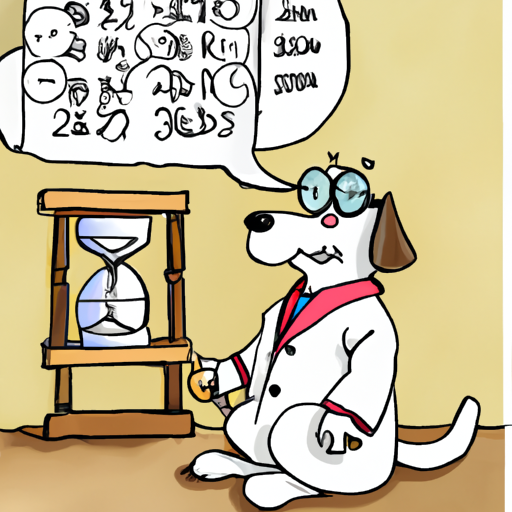As a caregiver, you have probably observed how your dog seems to know when it’s time for dinner or a walk. But do they actually understand the concept of time? Let’s explore this fascinating topic together.
H2: The Science Behind Canine Time Perception
Research into canine cognition and behavior has provided some interesting insights into how dogs perceive time. Unlike humans, dogs don’t have the ability to understand time in the abstract. However, they do exhibit what scientists call “episodic memory”, or the ability to remember specific events.
A dog’s sense of time is primarily based on:
- Their circadian rhythms, which control their sleep-wake cycles and feeding times.
- Their association of certain events with specific times of the day, such as expecting a walk or meal.
- Their memory of the duration of time that has passed since a specific event happened, known as “interval timing”.
H2: How Dogs Understand Daily Routines
Dogs are creatures of habit and thrive on routine. They recognize patterns and associate them with certain outcomes. For example:
- They might associate the sound of your alarm clock with you waking up and being available for a morning cuddle or a walk.
- They could link the sight of you putting on a particular pair of shoes with going out for a walk.
- They can associate the sound of a can opener or the rustling of a bag with meal times.
H2: Emotional Perception of Time in Dogs
Interestingly, dogs also seem to have an emotional perception of time. This is especially apparent when you leave them alone. Dogs that suffer from separation anxiety may exhibit signs of distress, which seem to indicate that they perceive your absence as a long, stressful period.
H2: How to Use Your Dog’s Perception of Time to Your Advantage
Understanding how your dog perceives time can be beneficial in training and routine-setting. Here are a few ways you can use this knowledge:
- Consistency: Keep your dog’s routines as consistent as possible. This includes feeding times, walks, and playtimes.
- Training: Use interval timing to your advantage in training. Giving rewards immediately after a desired behavior helps your dog associate the action with the reward.
- Separation anxiety: Gradually increase the intervals of time that you are away from your dog. This can help them get used to longer periods of absence.
H2: Frequently Asked Questions
1. Do dogs understand the concept of time?
No, dogs do not comprehend time in the abstract like humans do. However, they can remember specific events and associate certain events with specific times of the day.
2. Can dogs tell how long you’ve been away?
Dogs can perceive the duration of time that has passed, but not in the same way humans do. Their perception is more linked to routines and associations.
3. Can understanding my dog’s perception of time help with training?
Yes, knowing how your dog perceives time can be beneficial in training, especially when it comes to rewarding desired behavior.
4. How can I help my dog with separation anxiety?
Understanding your dog’s perception of time can help. Gradually increase the intervals of time that you are away from your dog to help them get used to longer periods of absence.



